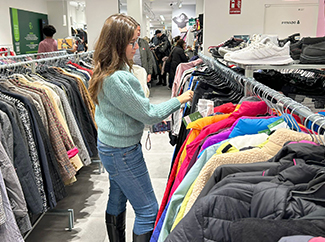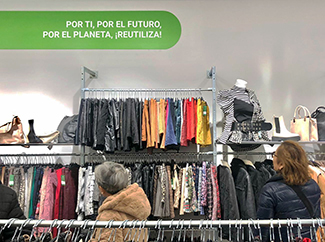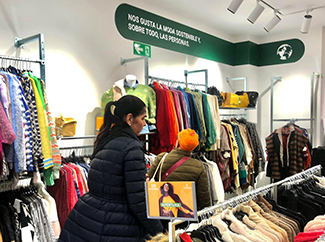consent_cookie
Duración: 1 year
Stores the user's cookie consent state
02-04-2025
Spain has around 800 second-hand fashion shops, half of which are in the hands of five social economy organisations. This shows that the secondhand retail sector is characterised to a large extent by its traditional social character, combined with a significant environmental benefit.
Humana Fundación Pueblo para Pueblo, the leading operator of second-hand fashion shops in Spain in terms of number of customers, is promoting the first report that quantifies the number of these establishments in our country.
The study counts 743 physical shops on the public highway in 178 municipalities, with data from 2024. The figure is likely to be around 800, as the report does not include small towns, where there may be establishments with this offer.
Half of the second-hand clothing offer is concentrated in three autonomous communities (Catalonia, Andalusia and the Community of Madrid), while the cities with the most shops are Madrid, Barcelona, Valencia and Seville.
The establishments counted are managed by 72 operators, either social economy organisations or companies. It is an atomised sector in which 47% of the supply is in the hands of social entities with a long history: there are 173 under the Moda re-brand (grouping Caritas entities) followed by Aeress with 66 (grouping different entities), Humana with 52, Madre Coraje with 33 and Cudeca with 24.
The main common element is that they are non-profit organisations that allocate the profits from their management to social projects. The other operators in the sector are either smaller entities or private companies, most of them with only one or two shops.
Corners in shopping centres
The report quantifies the number of second-hand clothing shops in Spain, physical shops located on the public highway and also inside shopping centres (this is the case of 37 outlets or corners in shopping centres). In addition, some major brands are taking a position in this market.
And there are also 55 online sales platforms as well as 21 markets in the cities of Madrid and Barcelona, either with a specific periodicity or a stable physical space (the Rastro in Madrid or Els Encants in Barcelona) or flea markets or ephemeral or itinerant initiatives.
The garments and articles on sale in the shops of social economy organisations come from donations made by citizens at selective collection points located on the streets or inside the establishments themselves, and in some cases from unsold stocks of fashion brands.
Shopping experience
Second-hand clothes shops have evolved enormously in recent years, both in terms of their offer and their external appearance. They have evolved from being crowded and unattractive spaces for the shopping experience, to spacious places, with a wide range of products and a wide range of services.
‘The second-hand clothing management sector is going through a crucial moment, with new legislation and great challenges in the short and medium term’, explains Rubén González, Retail Strategy Manager at Humana, “in this scenario, it is essential to know how many second-hand garments are put on the market, how many jobs are involved and how this translates into economic resources”.
Charity shops in the UK
The figure of 743 shops is a far cry from the 10,200 charity shops in the UK, which sell second-hand goods to support charitable causes. According to data from the Charity Retail Association, 90% of these shops sell second-hand clothes as their main activity; the remaining 10% specialise in furniture, electrical appliances or books, for example. In the UK, there are a thousand organisations operating charity shops, ranging from a single shop to more than 500.


